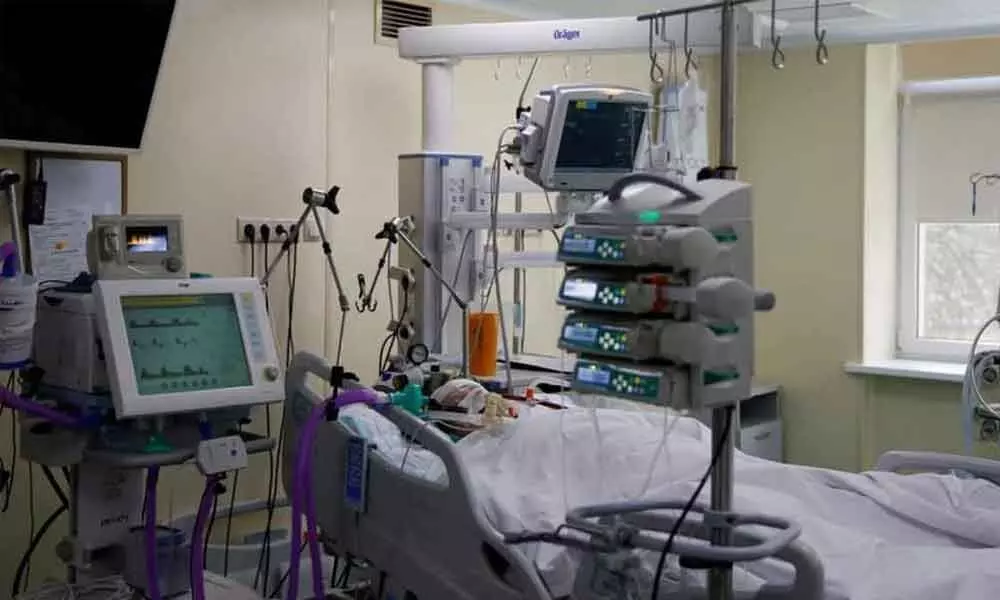Screen COVID-19 patients for blood clotting abnormalities: Researchers
 Screen COVID-19 patients for blood clotting abnormalities
Screen COVID-19 patients for blood clotting abnormalitiesSaying that critically ill COVID-19 patients may be at high risk for developing renal failure, venous blood clots, and other complications associated with blood clots, such as stroke, researchers have emphasised on the need for early screening
New York : Saying that critically ill COVID-19 patients may be at high risk for developing renal failure, venous blood clots, and other complications associated with blood clots, such as stroke, researchers have emphasised on the need for early screening.
Thromboelastography (TEG) is a whole blood assay that provides a broad picture of how an individual patient's blood forms clots, including how long clotting takes, how strong clots are, and how soon clots break down.
TEG is highly specialised and used primarily by surgeons and anesthesiologists to evaluate the efficiency of blood clotting; it is not widely used in other clinical settings.
"The COVID-19 pandemic is opening doors for multidisciplinary collaboration so trauma acute care surgeons and intensivists can bring the tools they use in their day-to-day lives and apply them in the critical care setting to new problems," said Franklin Wright, Assistant Professor of Surgery at the University of Colorado School of Medicine in the US.
The researchers evaluated outcomes for all patients who had a TEG assay as part of their treatment for COVID-19 infection as well as other conventional coagulation assays, including ones that measure D-dimer levels.
D-dimer is a protein fragment that is produced when a blood clot dissolves. D-dimer levels are elevated when large numbers of clots are breaking down.
A total of 44 patients treated for COVID-19 infection between March 22 and April 20 were included in the analysis.
Those whose bodies were not breaking down clots most often required hemodialysis and had a higher rate of clots in the veins.
These patients were identified by TEG assays showing no clot breakdown after 30 minutes and a D-dimer level greater than 2600 ng/mL (nanograms per millilitre). Eighty per cent of patients with both affirmative test findings were placed on dialysis compared with 14 per cent who tested for neither finding.
Patients with affirmative test findings also had a 50 per cent rate of venous blood clots compared with zero per cent for those patients with neither finding.
"These study results suggest there may be a benefit to early TEG testing in institutions that have the technology to identify COVID-19 patients who may need more aggressive anticoagulation therapy to prevent complications from clot formation," Wright said.
Their research was published as an "article in press" on the Journal of the American College of Surgeons website ahead of print.
The research team is now participating in a randomized clinical trial of a drug that breaks down blood clots in COVID-19-infected patients.
"This is an early step on the road to discovering treatments to prevent some of the complications that come with this disease," said Wright who is lead author of the research article.
Patients with COVID-19 infection are being enrolled in a randomized clinical trial of tissue plasminogen activator (tPA).
This drug is a natural anticoagulant that was approved by the US Food and Drug Administration in 1996 for the treatment of diseases associated with clotting disorders, such as heart attack, stroke, and pulmonary embolism.
The trial will assess the efficacy and safety of intravenous tPA in improving respiratory function and management of patients with aggressive blood clotting.
"This study suggests that testing whole blood clotting measurements may allow physicians to identify and treat patients with COVID-19 more effectively to prevent complications and encourage further research into therapies to prevent blood clots in these patients," Wright said.















